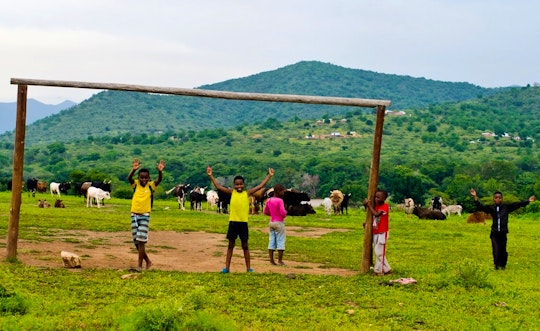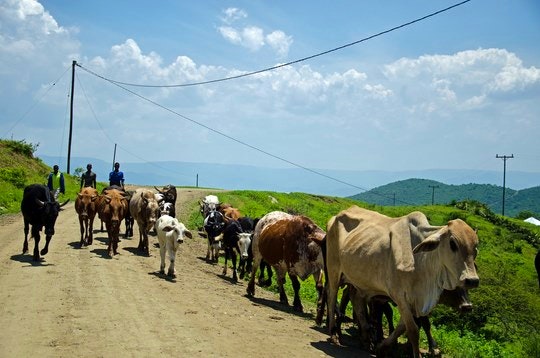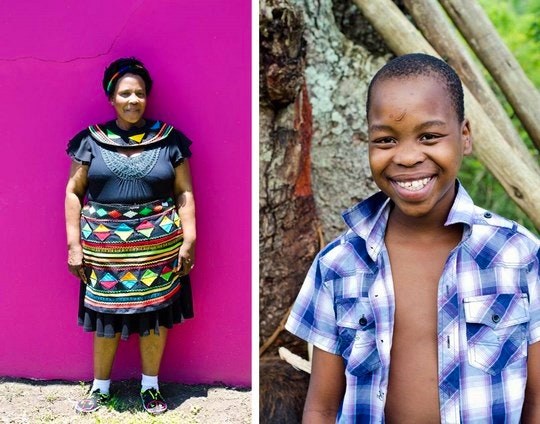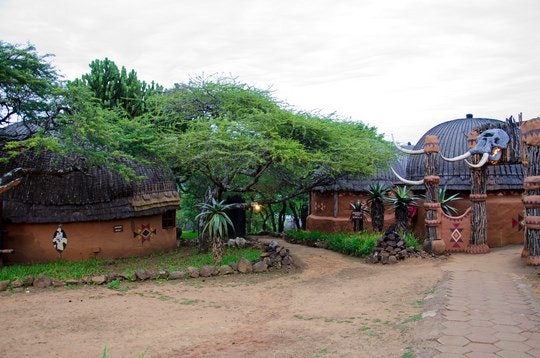Amongst the lush rolling hills where children kick soccer balls over dusty copper-red soil while tending cattle, and poverty is a constant threat, Ishay Govender-Ypma stumbles, unexpectedly, upon a personal sense of peace in Zululand.
Sanibona, Siyabonga
It’s been thirty minutes since we’ve seen a rondavel or a shed, and on this narrow dirt road our fastest speed is 40 kilometers per hour. The red earth is pocked indiscriminately with gaping ditches, whittled wider by afternoon rains. Sugarcane fields tighten around our rented SUV in a claustrophobic embrace.
I’m travelling with Zanele Mhlongo, a longtime primary school principal and first cousin of South African president, Jacob Zuma, a fact I learn much later in the day. Dino Mondlane, a local mathematics and science teacher accompanies us to assist with translations. My Zulu, since leaving Kwa-Zulu Natal at the age of 17, is rusty. My fanagalo, the pidgin Zulu spoken by madams to their housekeepers and gardeners, is even more so.
“Sanibona, siyabonga,” [hello, thank you], we practice.
Suddenly, the car slams to a halt. A herd of enormous Nguni cattle, majestic, with sun-dazed doe-like eyes, approach us. It appears that crossing the road will be the most important decision they make today, evidenced by how they measure their steps thoughtfully, ruminating over cud.
Sharp whistles precede the appearance of three shirtless young Zulu men. The herders urge the cattle across, clearing the path in minutes, and greeting us with wide smiles and waves. We wave back. This is a common practice in Zululand. Almost everyone you meet will say hello. Within the first five minutes we too, hoot and wave at passersby on the back-roads between Eshowe and Phongolo.
Mbongolwane, the Place of the Donkey
The tarred R66 that snakes through Zululand, a far easier passage, is one of the oldest trade routes in the area, where the ‘people of the heavens’, the Zulu, have known all sorts of occupation and struggles. Life in Zululand moves slowly as it bakes under the 36 degree Celsius summer sun. Everything takes a little more effort.
Children in Mbongolwane, which is known fittingly as the place of the donkey, might rise as early at 3:30 am, to be ready to walk the 15 kilometers of steep climbs and treacherous downhill footpaths to one of the small schools. On days when it rains, the soil becomes slippery like clay and even four-wheel drives struggle and strain. Children will stay at home.
The donkeys in the area, small, and resolute, are essential to daily life and are used to carry water from communal taps and rivers, and groceries from the distant trading stores. A city slicker’s notion of ‘rural’ is challenged, as life here, where electricity in some areas only arrived less than a year ago, is nothing like the life on small holdings where fed-up executives go to farm organic vegetables. In this area, many of the children will receive their only meal at school. The unemployment rate is in the high 80s.
It isn’t uncommon for children in grade 11, Zanele and Dino tell me, to have babies in order to procure the R250 monthly social grant for their families. The cycle is nearly impossible to break out of. This is a place of grinding poverty.
And yet, we are met with smiles and offers of cold drinks and wet face cloths wherever we visit.
Beer is for Men
At the house of Sobuhlungu Sithole and his daughter, Telekile, we are presented with umqombothi, a local beer, and the intricacies of beer making are explained. Maize, sorghum, and water, will over time create this beverage reserved for men. The women laugh when I try it. I ask Mr Sithole for permission to drink some. His eyes widen, confused.
Where the Hills Roll
Zululand is often described as place of many rolling hills and verdant vegetation, which it is. It appears to me that an artist may have stood at the top of the hill where the Mandawe cross presides, unfurling enormous ribbons of deep green satin from giant sewing thread spools. The satin ribbons cling to the curves of the hills and the dips of the valleys which part dramatically for the Phobane Lake and the Tugela River.
The Witchdoctor
At the start of a mountainous path, we stop for photographs and to allow yet another herd of cattle to pass by. In the distance we see a grouping of rondavels and huts, with a central kraal, the common arrangement in these parts. Zanele shakes her head, tut-tutting with disapproval as we stare at the homestead. A feared witchdoctor used to live there it is rumoured; a man of pure evil.
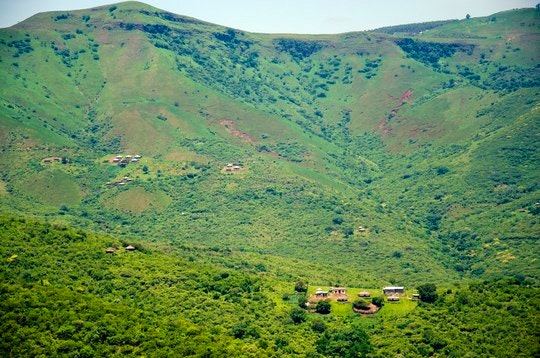
“I don’t believe in worshipping ancestors,” Zanele states to my surprise. “But this man, I avoided him. Avoided looking at that house…oooooh!”
I squint my eyes and try to get some feeling he may have left behind. I only feel the escalating heat drumming on my perspiring forehead, neck, arms.
“How did you know for sure, that he was what they said he was,” I ask, coaxing her. “Oh, he kept dwarves and other things. We all knew,” she says opening the car door.
Dwarves. I leave the conversation there. It’s real in the mind of those it affects; it’s a concept we all know too well.
The following day, as we navigate our way along the heritage route of the R66, smiling and waving at locals, stopping for cattle and photos, I realise that for the first time in many months, the knots in my shoulders have eased. A cool drink stop in the merciless humidity feels like a thing to treasure.
“Sanibona, siyabonga,” I sing to myself.
Things to do
- Fort Nongayi Museum Village –excellent starting point for local history and impressive museum of Zulu art with knowledgeable staff. Good place to buy unique, upmarket curios – all profits go the artists.
- The R66 route – pick up a free map and trace the route and history of King Shaka, the settlers and boy wonder John Dunn, a white chief with 48 Zulu wives.
- The Prawn Shack – serves a rustic 7-course meal that starts at noon. Cheap food and drinks, and a bare bones setting that can get loud. Secluded beach nearby.
- Shakaland – originally the set of the Shaka Zulu movie. Skip the ceremony if it’s too touristy for you and go for dinner. Outstanding views. Stay over in a dolled up hut, prices are steep though.
Stay:
Base yourself in Eshowe and travel out from here. Birds of Paradise is an excellent guesthouse with ample privacy. Just note that there are not many places to eat dinner, save the George Hotel and the Spur. For a more traditional stay with the mod cons, try Shakaland or Simunye Zulu Lodge.
Visit Zululand and find your own personal sense of peace.

